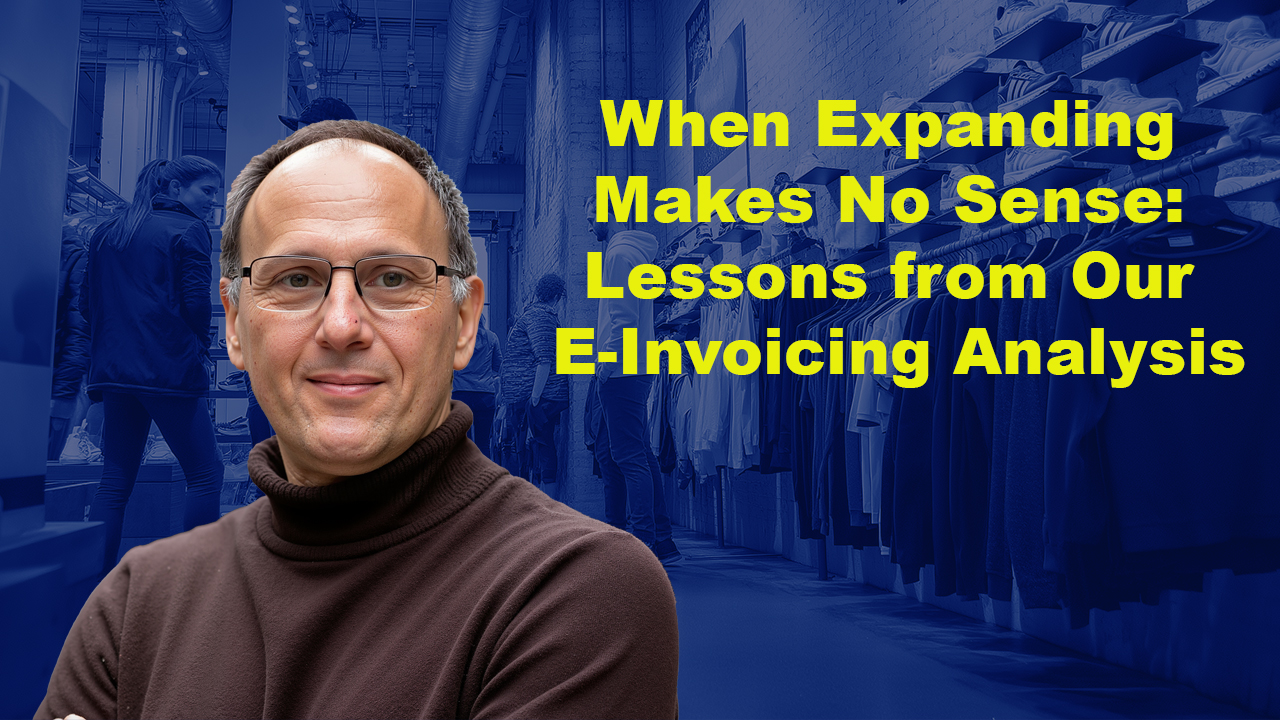
Every company looking to grow faces the same exciting yet risky question:
Should we enter a new market or develop a new product?
Recently, we at Fiscal Solutions asked ourselves exactly that.
E-invoicing is becoming mandatory across the world. According to current roadmaps, many countries plan to roll out national e-invoicing systems by 2027 or 2030. On paper, it looks like an enormous opportunity. So, we decided to analyze whether it made sense for us to invest in this area.
My colleague Milan and I created two independent analyses, each focusing on possible business models, technical needs, and market conditions. Once we brought them together, the conclusion was surprisingly clear: it doesn’t make sense for us to enter the e-invoicing business — at least not now.
But what we learned from the process is far more valuable than the decision itself.
Timing is Everything
Yes, e-invoicing is expanding quickly.
But timing isn’t just about growth — it’s about being ready before the wave peaks.
By the time we could develop a full-fledged e-invoicing product, many countries would already have implemented their national systems. That means the major contracts would be closed, and the market leaders firmly positioned.
The opportunity window would simply be gone.
In innovation, being late is often worse than not entering at all.
Understand the Competitive Landscape
When evaluating new markets, it’s essential to map your competition by depth and focus.
In e-invoicing, global giants like SAP, Sovos, Avalara, Deloitte, and EY already dominate the Tier 1 segment — the very same segment we serve in fiscalization. Competing against them would require deep expertise in accounting and ERP systems, not retail technology, which is our home field.
We realized we’d be walking into a game where other players not only wrote the rules — they’ve already built the stadium.
Stick to Your Core Competence
For 22 years, Fiscal Solutions has been fully focused on fiscalization and in-store technologies.
That’s our DNA. That’s where we innovate and lead.
E-invoicing, however, is a different domain — connected more to B2B transactions, ERP integrations, and accounting workflows than to retail and POS environments. The learning curve would be steep and expensive, and the potential returns uncertain.
Strategic expansion works best when it builds on your existing strengths, not when it requires you to become something completely different.
Without a Story, You Have No Sales
In any new business, storytelling drives sales. You need a credible narrative — a reason why customers should trust you in this area.
We would have no story in e-invoicing.
No references, no track record, no thought leadership.
We would look like complete newcomers in a field already crowded with specialists.
That’s not the kind of story that convinces enterprise clients to switch providers.
Sales Capability Matters as Much as Product Capability
Even if we developed the best solution, we currently don’t have a sales structure designed for B2B ERP-level products. Our processes, channels, and messaging are all optimized for fiscalization and POS vendors. Entering a new domain without a dedicated sales force would mean competing with global giants using the wrong tools.
Sometimes “No” Is the Smartest Strategic Move
After weeks of research, one clear conclusion emerged:
Just because a market is growing doesn’t mean it’s right for you.
Saying no can be an act of focus and strength.
By not chasing every opportunity, we protect our core, our expertise, and our ability to lead where we truly add value.
For now, e-invoicing will stay part of our content portfolio — meaning we’ll continue to provide information, analysis, and updates about it on our Fiscal Portal. That helps our existing customers understand how fiscalization, e-invoicing and ViDA intersect — all within one ecosystem of retail compliance.
We will continue pursuing the partnering strategy we’ve already started — one that allows us to support our customers even in this part of the retail ecosystem. A great example of this approach is our partnership with Avalara, including the integration of our solutions, which enables seamless compliance for retailers worldwide even on POS.
But as a product, it’s not our future.
The Framework: How to Decide If a New Product Makes Sense 🙂
If you’re facing a similar decision, here’s the framework we used — simple but powerful:
- Timing: Can you realistically enter before the market is saturated?
- Competition: Are you bringing something new or just joining a crowded field?
- Core competence: Does it leverage what you already know and do best?
- Narrative: Can you explain why you in one clear sentence?
- Sales readiness: Do you have people, channels, and processes to sell it?
- Strategic fit: Will it strengthen or distract from your core business?
If you can’t confidently answer yes to at least four of these, think twice.
Final Thought
Growth doesn’t always mean doing more.
Sometimes it means doing better within your area of strength.
By saying no to e-invoicing, we said yes to focus — and that’s the foundation for every sustainable success story.

